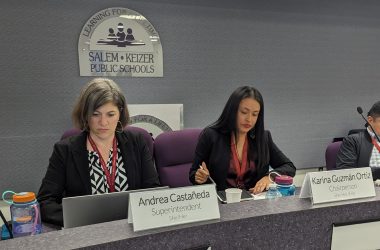A nonprofit dedicated to serving the needs of local Latino residents claims that the Salem-Keizer School District system for voting for school board members leaves Hispanic and Latino voters underrepresented.
The alliance initially pressed its claims in a lawsuit filed March 10 in Eugene U.S. District Court against the school district and Secretary of State Shemia Fagan, claiming that the school board’s practice of electing directors at-large violates the Voting Rights Act of 1965. The system allows all voters in the district to vote for every board seat even though directors represent geographic regions of the district.
The alliance subsequently decided to drop the lawsuit but will continue pressing for reforms.
James Vick, a Salem attorney representing the alliance, said the alliance is not pressing the case because previous court rulings have established that Hispanic and Latino people would have to make up 50% of the district’s population to change an at-large voting system.
He said the alliance anticipates the judge will rule in favor of the district without a trial.
“Should the case law change in the future, we would consider refiling the case,” he said in an email Monday.
Vick said the existing voting system disadvantages Hispanic and Latino neighborhoods and discourages potential candidates from running.
The alliance said in its complaint that the voting practice impedes Hispanic and Latino voters’ ability to elect their preferred candidates and dilutes their voting strength.
“The district recognizes that this is occurring, but they rationalize that the disadvantage is not significant enough to require a change. Therefore, the district stonewalled us on this issue and opted to have their lawyers defend the suit rather than meeting with the us and the community,” according to Vick.
District spokesman Aaron Harada said that “neither the law nor the data” reflected that the election system disadvantages Hispanic and Latino neighborhoods.
Redistricting Partners, an independent firm based in Sacramento, analyzed school board election results from 2015 to 2021. Harada said Tuesday that the firm intends to schedule a public meeting with the school board in early April to discuss its finding.
The alliance’s lawsuit sought an order that the school board’s procedure violates federal voting law, and an order preventing the board from holding at-large elections.
“Allowing the community to vote for a representative in their own district is an easy solution,” Vick said.
“The effects of this discrimination are occurring at levels not quite meeting the judge-made standard,” Vick said. “It is truly unfortunate that the district has not been more responsive to the community on this issue.”
The complaint said Hispanic and Latino people are disproportionately represented compared to white people in three of Salem’s school board voting districts.
Hispanic and Latino people make up 15,702 of 37,630 people, or 42%, in the school board seat representing east Salem – Zone 2.
In the seat serving southeast Salem (Zone 5), they are 14,118 out of 38,093 people, or 37%.
Hispanic and Latino people are 14,840 out of 38,153 people, or 39%, in the school board district in north Salem (Zone 7).
They make up 26% of the total district, according to the complaint.
Harada said Monday that district leaders have “been actively working to research and evaluate” the U.S. Census Bureau’s 2020 data and its impact on school board elections.
He said the data shows the current at-large voting does not dilute minority groups’ voting power. “In fact, the data instead shows the current at-large voting process is more reflective of the will of minority voters than if zone voting were used,” he said.
The Oregon Legislature passed HB 3310 in 2019, which made school districts potentially liable if their board election process results in racially polarized voting.
That term refers to when a minority group prefers one candidate or issue, while the majority prefers another “to the extent that it negatively impacts the minority population and their ability to elect their candidate of choice,” according to the California firm’s analysis.
The report said there was no evidence of racial polarization and that “tells us that there isn’t a trend of support for a candidate in relation to race.”
The report also said election data by school district zone showed “low to moderate levels of polarization between Latino and white preferences,” with the candidates favored by Latino voters being successfully re-elected in most contests.
Zone 3 showed the highest levels of polarization in 2017, when candidate Jonathan Baker drew nearly 70% of his support from Latino voters and 39% support from white voters. The winning candidate, Sheronne Blasi, received 30% of her support from Latino voters and over 60% from white voters.
Another voting breakdown by the firm said that in the four elections during that period, the candidates of choice among white and Latino voters were inconsistent with candidates’ ethnicities.
The Salem-Keizer School District has historically elected board members through at-large voting. Candidates are required to live in a specific zone but receive votes from electors in all zones, according to Harada.
In November 2021, Superintendent Christy Perry led a board discussion on board zone redistricting based on the Census data, and the Mid-Willamette Valley Council of Governments created two possible maps. A board meeting was held three weeks later to review the redistricting process and receive public feedback.
The board adopted a new map on Dec. 14, 2021, that reduced the portion of south Salem included in Zone 1, which covers all of west Salem, but didn’t eliminate it.
Contact reporter Ardeshir Tabrizian: [email protected] or 503-929-3053.
JUST THE FACTS, FOR SALEM – We report on your community with care and depth, fairness and accuracy. Get local news that matters to you. Subscribe to Salem Reporter. Click I want to subscribe!

Ardeshir Tabrizian has covered criminal justice and housing for Salem Reporter since September 2021. As an Oregon native, his award-winning watchdog journalism has traversed the state. He has done reporting for The Oregonian, Eugene Weekly and Malheur Enterprise.









